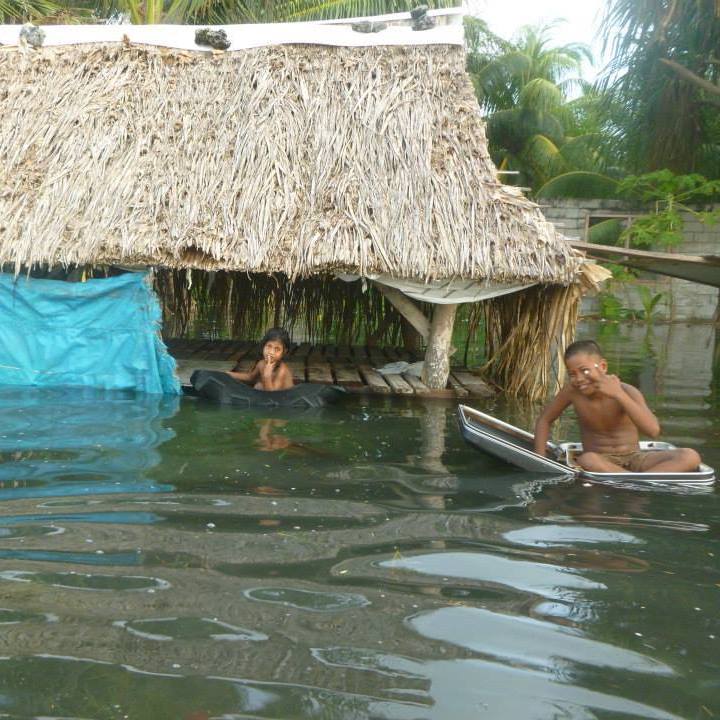“Baba, are you going to build us a boat?” A little I-Kiribati girl asks her grandfather. “What for?” He asks. She replies, “When the whole ground is covered with water, we have a place to jump on.”
This little girl was talking about losing her Kiribati home to rising sea levels and climate change.
You might be googling maps right now to try and find Kiribati. I did when I first got my Peace Corps assignment back in 2004. Look between Hawaii and Australia. Near Fiji. Let your finger trace the endless ocean on the map to find that little speck of land. Fully appreciate how vulnerable a piece of land like this would be if the sea level rises any more than it already has. Imagine the sea swallowing up an entire culture. Multiple cultures, just because the “developed” world was too busy considering politics to show compassion while it had the chance.
But there is still a chance to save them and their neighboring small island nations.
As their President, Anote Tong, pleads their case at the Paris Climate Summit, we, the adopted children of Kiribati, share their stories.
Tamana Island (one of many small atolls of Kiribati) was my home for two years. Explaining Kiribati is a little like trying to explain a magic trick or why a joke is funny. But because their culture is exactly what’s at stake, I will do my best.
Music.
I love the blues and have always felt drawn to the heart of it; the intention. Imagine people singing with that amount of soul. In Kiribati, they do. The layering of voices over the banging of a percussive piece of wood melding, oozing together until you aren’t sure if they are singing or you are singing and you don’t care as long as it doesn’t stop. Even little kid’s voices have the old souls of people long acquainted with the land and the sea and the stars.
Laughter.
You can tell a lot about a culture by the way it treats its poor, its women and its environment. But also by its sense of humor.
Kiribati has some problems. It is, after all, full of people. But the people of Kiribati and more directly, Tamana, have a sense of humor that forbids a person from taking themselves too seriously. They were known for “Tae tae ni butae.” Basically, talking sh*t. I was made fun of for my poor dancing skills as a gateway joke. Then it only escalated into dirtier and funnier material I will not share here.
Once I could hold my own and bust chops in Gilbertese (the local language) I knew I was in good shape.
Hospitality.
Kiribati taught me everything I know about welcoming strangers. They took me in as a giant American toddler, essentially. I knew no language. They had to tell me what to wear and correct me if I made some cultural blunder. They fed me. They taught me how to gut fish and start a fire from scratch. They fattened me up on donuts and coconut milk, my ultimate weakness. I gained 30 pounds in three months. I wore only baggy skirts and had no idea.
They told me I was fat and beautiful.
You have to know about tea in Kiribati. My friends had no interest in any business or conversation before a cup of tea. Usually tea with a half cup of sugar in it. But the ritual was completely enchanting. What I had to say, I learned, could wait. People are more important. And it sticks with me even now. We lived on a scrap of land two kilometers around. We weren’t going anywhere, so what was the rush?
Kiribati also planted the seed for another culture I would learn to love: sailing.
One Easter Sunday, I was sitting in church, wearing my best yellow muumuu when the whispers started flying.
Through the open window, I turned to see a beautiful sailboat anchored out in our swimming channel. Everyone was speculating on who this (other) white woman with the pale, pasty skin was. My friends pushed me to talk to her so I could get the dirt.
This mystery woman was writing a book on Robert Louis Stevenson and was retracing his voyages. And I was invited to join them for Easter brunch aboard the boat. I learned she was the wife of a famous Scottish comedian, Billy Connolly. I was barefoot in my sexy muumuu and she was drinking champagne out of crystal and researching a book. I had to laugh at the scene.
During one of several trips to the buffet, I got to ask the crew questions. This was a job? People got paid to sail on these boats? Amazing. Also, I hadn’t spoken English in a while and I relished the chance to babble nonstop.
We promised to keep in touch and I told them I would definitely look into it later when I was ready. As kind as this crew had been, I was ready to go back to my island.
I didn’t want to be here, talking with fancy people and eating fancy brunch while my friends were waiting patiently for the details of my adventure.
I can absolutely identify that as a turning point in my cultural experience.
The crew rowed me back to shore with an armload of People magazines for my friends. As I wished them safe travels, my shoulders went down and I exhaled. I was no longer “on.” I was home.
Back on Tamana, the first thing I did was join my friends in the mwaneaba (meeting place). We sat cross legged on the cement floor and they asked for every detail. They fanned flies away from me and offered me a plate of dried stinky salt fish. I am dead serious when I say I have never tasted anything better.
After that, I experienced the culture of Tamana richer and more deeply than before. Not because they had changed, but because I had.
And I began to listen—really listen to the stories people told me on Tamana. Old folks told tales of war planes flying overhead during battles of WWII. They told me at one point white people brought them sugar and tobacco and now here I was, telling them those things were unhealthy. I understood why I might seem hypocritical or hard to trust. But they trusted me anyway.
We sat around often and listened to the BBC for about 15 minutes each day. During that time, my host family would grill me about life in the US. George Bush was a huge source of confusion for them. I told them they weren’t alone. We all learned election results together and talked a lot about my life back home. They told me they pictured all Americans owning guns and asked me if I was scared to live there. Sometimes, I said. Because for all the intelligent people living there, there are a lot of irrational decisions and laws made that we can’t seem to do anything about. Sometimes it’s maddening. And that was over 10 years ago.
Meanwhile on Tamana, they used solar panels and fished only as much as they needed. They re-used everything, understanding that you have to protect the earth if you want to live off of it.
I relied on these people for every single thing. They were my friendship, my knowledge, my stimulation, my confusion, my beauty and my occasional frustration.
My two years there was a only cultural surface scratch of Kiribati in a lot of ways. I still have a lot to learn. But I want to do everything I can to make sure that the people who took me in get taken care of.
I hope the Paris climate talks are substantial and real. I hope our collective leadership just throws down and gets raw with drastic emissions cuts and super bold legislation to protect our environment.
I want to see a decision by a group of people in power and think: I can’t believe they did that. In a good way.
I hope they take care of Kiribati and all the developing nations who need help now, so we don’t lose these vibrant cultures full of music, hospitality, laughter and things we haven’t even discovered yet.
They deserve to feel safe and protected. They deserve to keep their place on the map.
~
Relephant Read:
This 15 Year-Old Gives Me Hope about Climate Change.
~
Author: Erin Johnson
Editor: Catherine Monkman
Photo by Kiribati Abau Ni Koaua (with permission).









Read 0 comments and reply